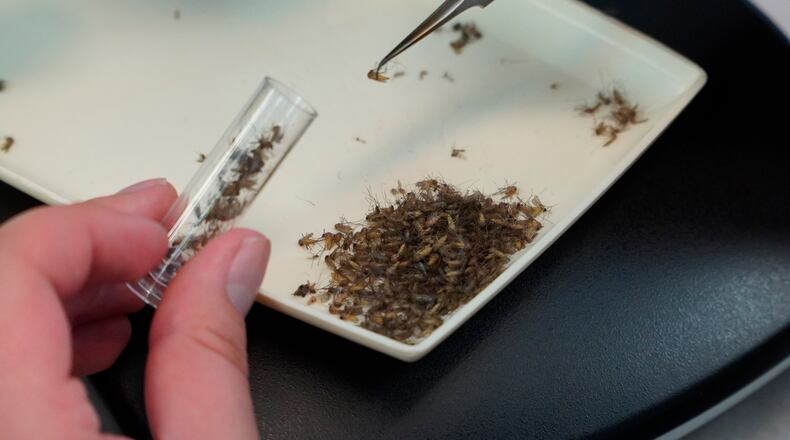West Nile virus is the leading cause of mosquito-borne disease in the continental U.S., according to Public Health - Dayton and Montgomery County. It is most commonly spread to people by the bite of an infected mosquito. Cases of West Nile virus occur during mosquito season, which starts in the summer and continues through fall.
“The state does have a statewide program where counties collect samples and then send them to the state for testing,” said Dan Suffoletto, Public Health’s public information manager.
Symptoms, risks of the virus
Anyone can get sick with West Nile virus, but adults 50 and older are more at risk for severe disease, according to the Ohio Department of Health.
There are no vaccines to prevent contracting the West Nile virus, and there are no to treat it in people, but most people infected with West Nile virus do not feel sick, according to Public Health.
Those who do develop symptoms usually do so between two to 14 days after they are bitten by the infected mosquito, according to ODH. About one in five people who are infected develop a fever and other symptoms like headache, body aches, nausea, vomiting, swollen lymph glands and a rash on the chest, stomach or back.
About one out of 150 infected people develop a serious, according to Public Health. Death from infection with West Nile virus occurs in 10% of those diagnosed with severe illness, ODH says.
Mosquitoes in Clark, Greene counties
In July, mosquito samples collected by the Clark County Combined Health District tested positive for West Nile Virus, the first for this year. The samples were taken at the end of June and beginning of July on the east, west, southeast and southwest ends of Springfield, Moorefield Twp., North Hampton and Park Layne areas.
Last week, a mosquito from Fairborn also tested positive for the West Nile virus, Greene County Public Health said. The treatment for mosquitoes was unable to be completed Monday morning due to an equipment malfunction. Greene County Public Health intends to treat later this week, the department said in an announcement also dispelling misinformation.
The organic treatment Greene County is using for mosquito mitigation is an EPA-approved spray called Merus and is made of chrysanthemums, Greene County Public Health said.
The droplets of spray affect mosquitoes and insects smaller than them. Greene County also works with beekeepers throughout the county so the department can avoid spraying near the hives, but bees are not typically active during the times that treatment occurs.
The mosquito mitigation treatment does not affect vegetable gardens, flowers, pets or humans, Greene County Public Health said, adding the spray is inactive a few minutes after application. The department conducts these treatments in the very early morning between 4-7 a.m. or after sunset between 9-11 p.m., and it ceases spraying an area if there are people or pets nearby.
Other monitoring in mosquito season
Most cases of West Nile virus reported in Ohio are in adults aged 70-79 years, particularly men, according to ODH. There were 18 cases of the West Nile virus among people last year in the state of Ohio, including two people in Montgomery County. One person in Butler County also had the West Nile virus last year.
There were no human cases in the remaining area counties last year.
Mosquito season runs from May through October each year, but most human cases of the West Nile virus are reported in July through October.
Human cases of the West Nile virus have been reported in more than two dozen states so far this year with the most being seen in Texas at 37 people, according to the Centers for Disease Control.
Butler County is testing
The Butler County General Health District is also collecting and testing mosquitoes for the West Nile virus.
“We’ve been doing this since the beginning of mosquito season/summer. So far none of our pools have come back positive with WNV (West Nile virus) or another zoonotic disease of concern,” said Erik Balster, Butler County health commissioner.
Given that mosquitoes in surrounding counties have tested positive for the West Nile virus, Balster said there could potentially be mosquitoes with the virus around in Butler County as well.
Reducing the risk
People can reduce their risk of West Nile virus by using insect repellent and wearing long-sleeved shirts and long pants to prevent mosquito bites.
Residents in the area should eliminate standing water wherever possible, local health departments say.
“Prevention starts with not letting mosquitoes lay eggs in the first place,” said Stephanie Johnson, public information officer for the Clark County Combined Health District.
Hundreds of mosquitoes can breed and hatch from a bottle cap of water, she said.
“It’s out there in your yard even with our drought conditions,” Johnson said.
Places where standing water might be in people’s yards include flower pots, buckets and barrels. People should change the water in pet dishes and replace the water in bird baths weekly. Drill holes in tire swings so water drains out. Keep children’s wading pools empty and on their sides when they aren’t being used.
More tips
- Use EPA-approved mosquito repellent containing DEET and follow the label directions.
- If you are outdoors between dusk and dawn when mosquitoes are most active, be sure to wear long pants, a long-sleeved shirt, shoes and socks.
- Wear light-colored clothing, which is less attractive to mosquitoes.
- Install or repair screens on windows and doors to keep mosquitoes out of your home.
- Make sure all roof gutters are clean and draining properly.
About the Author

